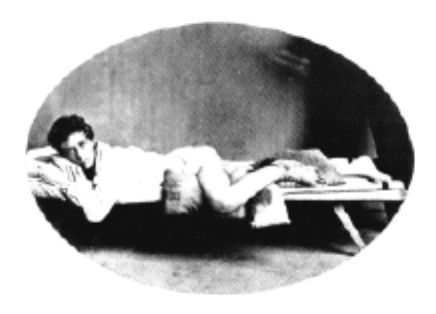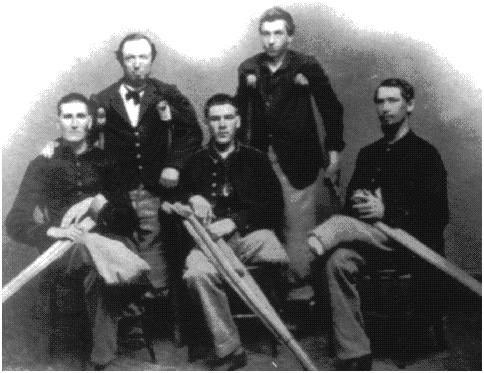
The Avenger
Takes His Place
Andrew Johnson and
The Forty-Five Days that
Changed the Nation
Howard Means
(Harcourt)

Andrew Johnson was fearless, brave, noble, and inspired; he was also humorless, blind to the subtleties of human relations, deaf to the words of others, and blithely convinced that he and he alone knew the truth. In a word, he was pigheaded --- not unlike some of our contemporary political leaders.Unlike our contemporaries, however, he was not born with a silver spoon in his mouth; more likely, he was born with a silver foot in his mouth.
Johnson's father died when the boy was four; there was no money, so he was bound out as an apprentice --- a form of indentured servitude --- when he was nine. He never went to school, but taught himself to read when he was seventeen. He became a "mudsill tailor" (working in a shop with packed dirt instead of flooring) and ended up in Greeneville, Tennessee when he was twenty-two, family in tow. Means tells us that in Johnson's collected letters we can find one written when he was twenty-three, that it "is an adventure in spelling:""cum" for "come," "sumthing" for "something," "git" for "get."
What he learned in his 20s was that he was good not only as a tailor, but at "stumping" --- getting up and letting go with a peroration. No radio, no television, no YouTube, no instant messaging in those days. If you wanted to hear something besides the crickets in the hearth and the cows in the field, you went to the nearest town to participate in the best diversion of them all: political stump speakers.
"Andy Johnson was the best stumper in America," Means reports. "And by mid-nineteenth century, stumping might have been the most indispensable of all political skills." No billboards, lawn signs; no thirty-second TV spots; no campaign managers nor spin-doctors. Just you, coming to town on a mule, speaking loudly with a certain logic. What Johnson did was to "lay out a proposition and craft rebuttals and rejoinders while he caught his breath."
He had a warehouse of allusions, enough demagoguery to stir the juices, the salt of bitterness to keep things interesting, a healthy disrespect for authority if it ran counter to his own instincts and beliefs, and the stamina to stay at it all day and night if need be.
Johnson was an odd duck. He knew how to win public office (governor of Tennessee, member of U. S. House of Representatives and the U. S. Senate, Vice-President), but he didn't believe in wheeling-and-dealing, horse-trading, charming the opposition, give-and-take; and, as everyone knew, he couldn't be bought.
During his swearing in ceremony in March of 1865, Johnson was suffering from typhoid fever and a hangover. Beforehand, to spruce himself up, he downed three glasses of whiskey. When came his turn to speak in the Senate chamber, he got up in front of hundreds of important leaders in the country and proceeded to dance on the podium with a lampshade on his head. I mean, he rambled, he muttered, he swayed, he repeated himself, and at one point, he referred to the many diplomats before him as "You with all your fine feathers and gewgaws." Finally, he "held his lips to the bible on which he had been sworn in, saying loud enough for everyone to hear, I kiss this book in the face of my nation of the United States."
Great comedy. A master-stroke, one that might have brought him a sitting ovation, but, according to the author, he never, once in office as Vice-President, nor later as President, repeated this show-stopping performance. It did give him a certain air. And, as we know, politicians, preachers and others of their ilk don't know how to forgive and forget such shenanigans. And Johnson was certainly not one to ask for forgiveness.
§ § § The Avenger is ostensibly about Johnson's first forty-five days in office but this is silly. A historian has to spend a little time on the where and the how and the when, both before and after the main drama. This is, rather, a story of how Johnson grew up, how he got started in politics, how he got pulled into being Vice-President. And how he blew it, creating a firestorm of loathing for his presidency; surviving impeachment by one vote; being regarded, down to our own time, as one of the worst presidents in the line of a nation's presidents --- relegated by historians to the level of Warren G. Harding, Herbert Hoover, and the present incumbent.
Means' volume is fun to read. More than that, his pictures of the south after defeat, of the rampage of the Radicals, of Johnson himself, of the times (and the fury of the times) is diligent, rings true. The book is, too, a hotbed of facts:
- The term "forty acres and a mule" originated with William Tecumseh Sherman, trying to figure out what to do with the black freedmen, huge numbers, trailing after his army. His idea, later vetoed by Johnson, was to award them parts of the plantations (and livestock) of the defeated Southern gentry;
- "Because the Constitution did not allow states to secede," according to the president, "secession and the Confederate States of America had never happened. The perpetuity of the Constitution brings with it the perpetuity of the States." Thus the states "could not be treated as conquered territories," as Thaddeus Stevens and the other Radical Republicans demanded.
- Johnson showed early on a profound loathing of the owners of immense plantations. He wanted to carve these landholdings up, give them to "free, industrious and honest farmers." But this did not include the newly-freed blacks (Johnson had owned slaves himself). Thus, according to Means, the president was a kind of racist Marxist: From the oligarchs according to their means, to the white workers according to their needs.
- One of the factors in the defeat of the south was salt. Did you say "salt?" Yes, salt. "Union Navy units methodically destroyed Southern salt works and the naval blockade kept imported salt from Southern ports. Without salt, meat went uncured. Uncured, it couldn't be transported far or kept long. For an army traveling on its stomach in the 1860s, an absence of salt spelled disaster."
Means' studious book suffers but three deficiencies. First, we would have liked go as far as the impeachment itself, instead of ending the book with a merry Johnson giving pardons to thousands of Southerners. After the second rebellion --- Congress vs. Andrew Johnson --- "The power to pardon was the one Constitutional tool he had in his kit."The other two failings of Avenger are rapidly dispatched. First is the commonly held belief that had Lincoln lived, the Radicals would have been either subdued or lulled into a policy of kindliness to the rebels. Hardly. Means himself provides us with an excellent picture of the havoc that the war brought to both sides; the north was deeply in debt, all were weary with the bloody rift; the south was prostrate, with no infrastructure, no food, no livelihood, no hope, nothing. To think that those in and around Congress would be satisfied with "excessive leniency" is obtuse. The rebels could go hang, for all they cared.
Had he lived, Lincoln would have had few cards to play outside of his charm and stock of jokes. His "ten-percent solution" (that ten percent of the citizens of any state could petition for that state to be readmitted to the Union) was a pipe dream, and the likes of Edward Morgan, Charles Sumner, Benjamin Wade, George Julian, Edwin Stanton, and Thaddeus Stevens would not have stood for it. They wanted vengeance, and vengeance would be what they got, no matter who pretended to be top dog.
The final (and biggest) error of Avenger is the portrait of Lincoln as a wise, all-seeing, politically savvy, almost saint-like figure. This is nonsense. He was a depressive schizophrenic, and those who have spent any time at all with the American Psychological Association's DSM know that schizophrenics like Lincoln have great manipulative ability, are able to bend whole peoples to their deranged way of seeing things. The rebellion could have been settled peaceably in 1861; slavery was well on its way out of town; to embark on the Civil War --- always a loser for everyone concerned (see Russia 1918 - 1920, Mexico 1910 - 1920, Spain 1936 - 1939, China 1860 - 1870) --- with the claim that all would be the better for it was the cruelest stroke of them all.
Because of Lincoln's rhetoric and his all-too-convincing hallucinations, the country was deep fried in a rampage that lasted for four years. It killed and maimed almost 1,000,000 people --- including those who died on the battlefield, those who starved to death, those who died of horrendous infections in military hospitals, those citizens whose lives were claimed by the many diseases that move alongside the Eagle of War and, possibly worst of all, the hundreds of thousands who were driven mad and to an early death by the brutality of it all.
As Means himself points out, this holocaust left "almost half the land mass east of the Mississippi in shambles [and] four million refugees set loose on a barren land." It was an imbroglio conceived by one man alone, a man who was intellectually warped and socially isolated; a gangly lunatic stalking about in a top hat and string tie with little reason.
